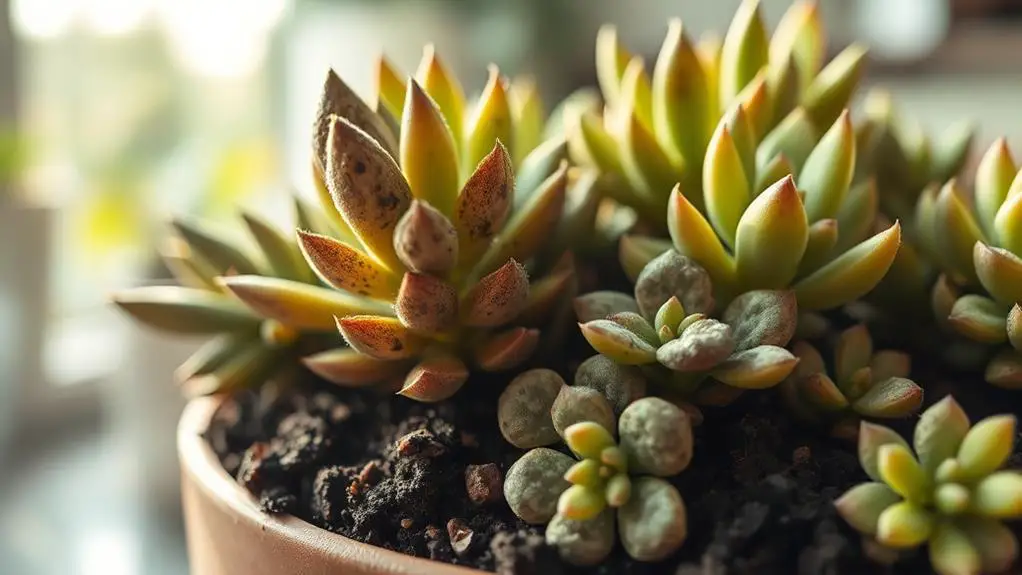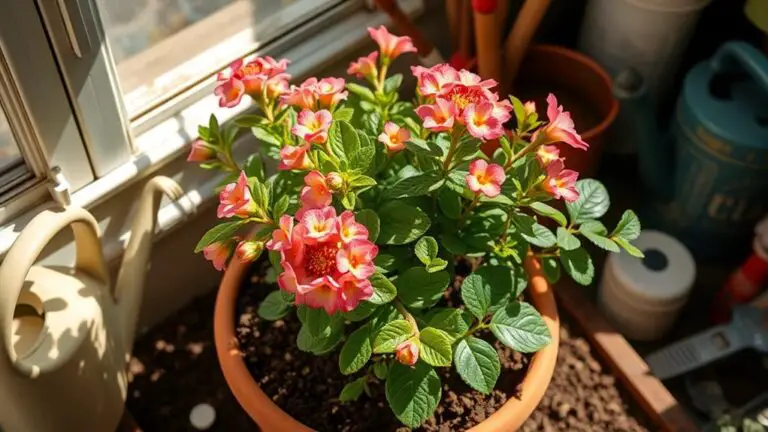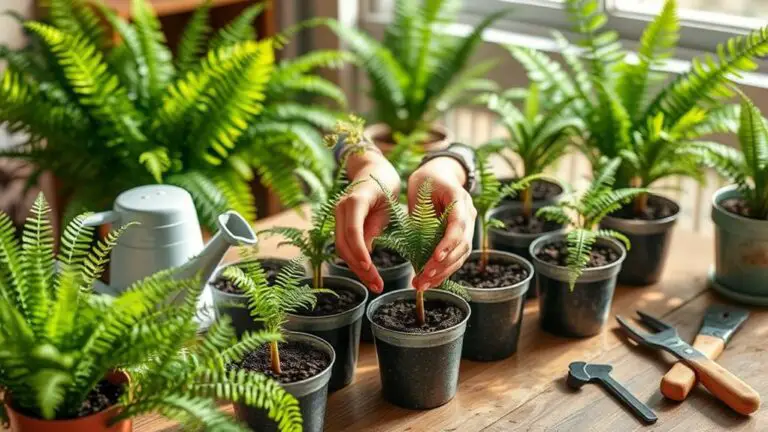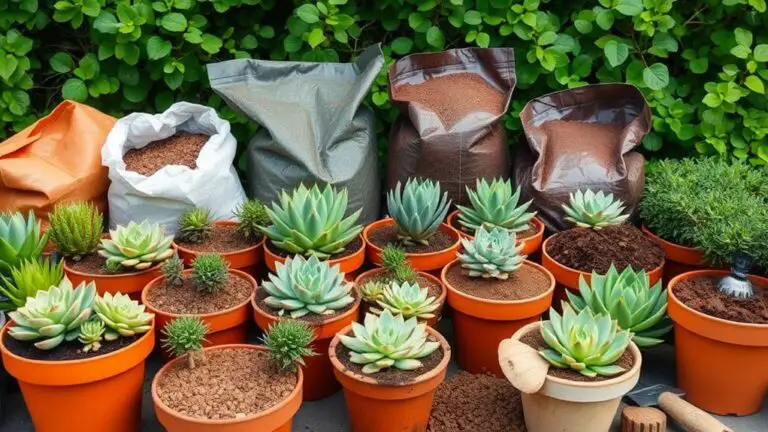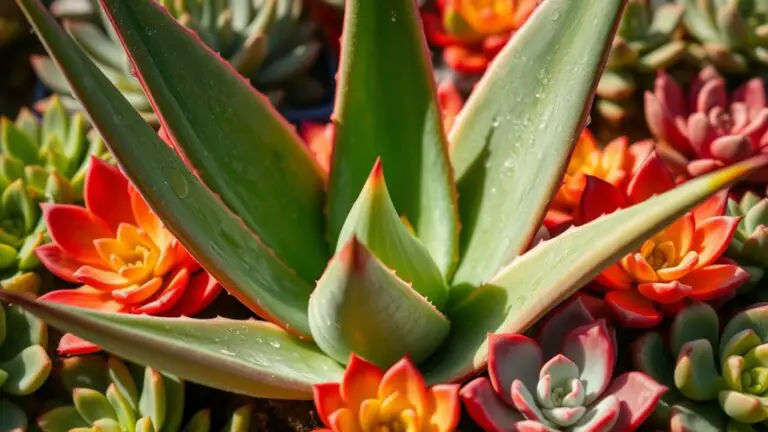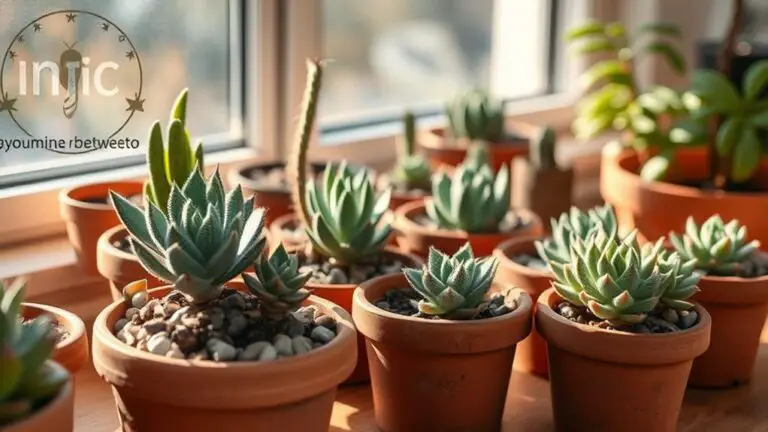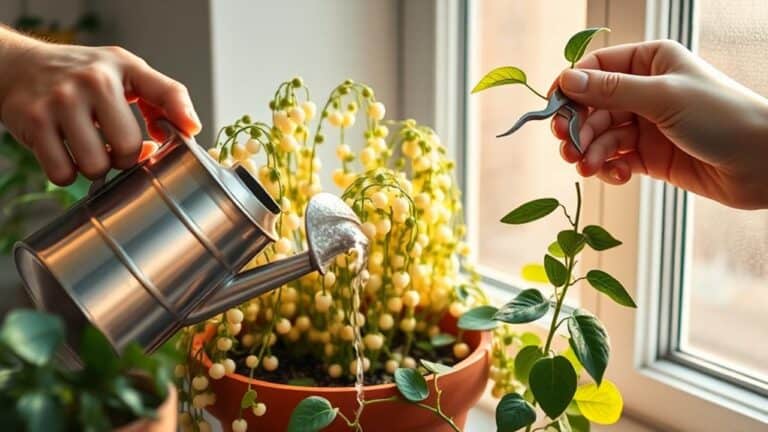Why Do My Succulents Smell Bad?
Have you noticed a foul smell coming from your succulents? It's not just an unpleasant surprise; it's a sign that something's wrong. Overwatering often leads to root rot, creating decaying roots that emit a nasty odor. But that's not the only culprit. Fungal infections, poor drainage, or even over-fertilization can make your beloved plants stink. There's also the possibility of pet urine or moldy soil contributing to the problem. To keep your succulents healthy and odor-free, you need to understand the underlying causes and how to address them. So, what's really causing that smell?
Root Rot
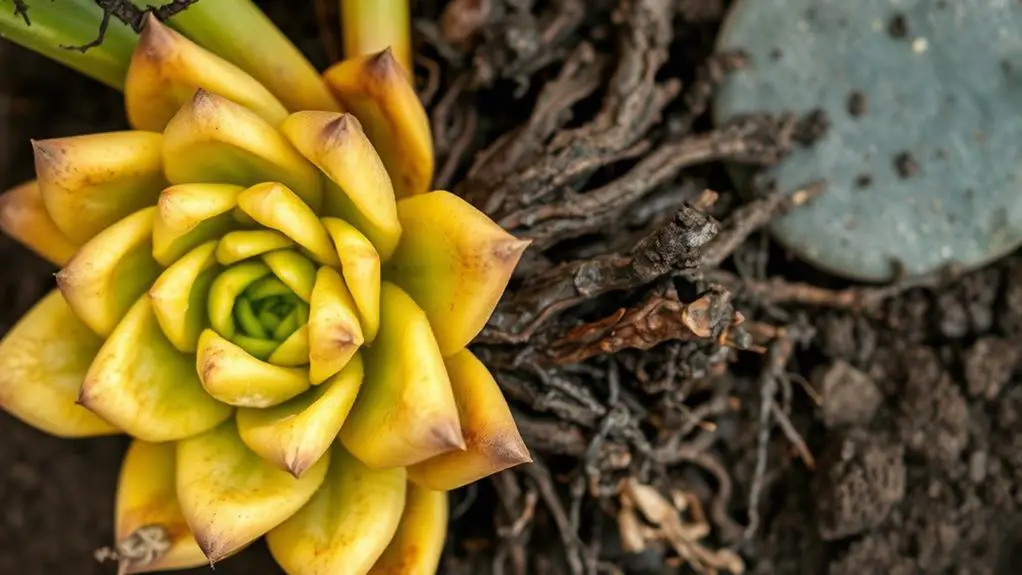
When your succulents start to smell bad, root rot is often the culprit. Root rot in succulents usually happens because of overwatering. Too much water keeps the soil too moist, leading to decaying roots.
You'll notice dark brown or black roots and a foul odor coming from the soil. The leaves might also become mushy or turn yellow.
To save your succulent, you need to act quickly. Start by pruning the affected roots. Cut away any that are dark brown or black.
After that, repot your succulent in fresh soil that's well-draining. Make sure the new pot has adequate drainage holes to let excess water escape. This helps prevent the soil from staying too wet.
Monitoring soil moisture is key. Let the soil dry out completely between watering sessions. Use your finger to check if the soil is dry before adding water.
These simple preventive measures can stop root rot from coming back. If root rot is left untreated, it can kill your succulent.
Early detection and intervention are critical. By following these steps, you'll help your succulents thrive and keep their roots healthy.
Fungal Infection
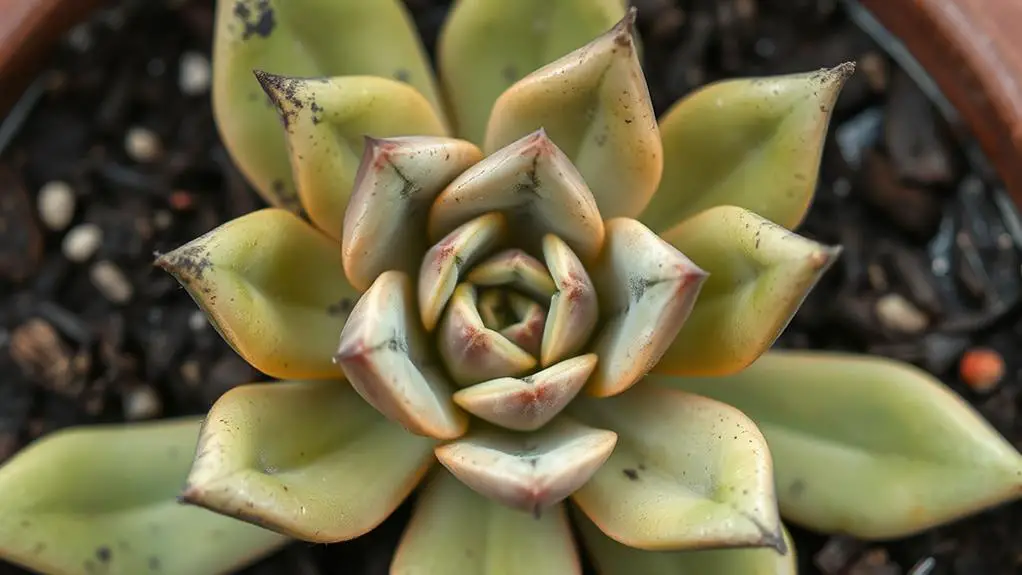
Fungal infections can make your succulents smell bad and look unhealthy. When your succulent experiences sudden environmental changes, it can lead to moisture in the soil and on the leaves, creating a perfect environment for fungal growth. This often results in unpleasant odors, discoloration, and the decay of plant parts.
To identify a fungal infection, look for these signs:
- Unpleasant odors: Fungal infections produce foul smells that are hard to miss.
- Discoloration: Leaves may turn yellow or brown, indicating a problem.
- Powdery mildew: A white, powdery substance on the leaves is a telltale sign.
- Decay of plant parts: Stems and leaves may start to rot and break down.
Preventing fungal infections involves maintaining stable environmental conditions. Overwatering is a common culprit, so make certain you water your succulents sparingly.
Make sure they get adequate sunlight exposure, ideally 4-6 hours daily, to reduce moisture levels on the plant's surface.
If you notice signs of a fungal infection, treat your succulent with a fungicide or a homemade solution like diluted dish soap. This will help manage the problem and keep your succulent healthy.
Excess Fertilizer
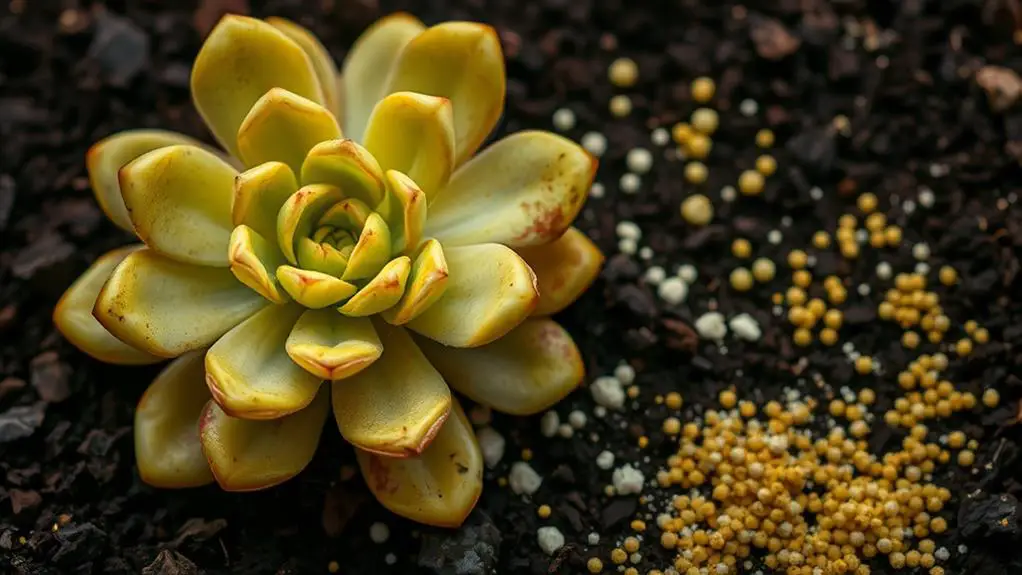
Too much fertilizer can cause your succulents to smell bad. When you over-fertilize, excess nutrients and salts build up in the soil, leading to unpleasant smells.
You might notice other signs of over-fertilization, like yellowing leaves or stunted growth. These are clear indicators that your succulent needs some help.
Using liquid fertilizers can be tricky. Always dilute them with water in a 50/50 ratio to avoid over-concentration.
Remember, succulents don't need a lot of fertilizer, especially during their dormant phase. Over-fertilizing can harm your plant, so it's vital to follow recommended guidelines.
If you still notice bad odors, it's time to take action. Repotting your succulent in fresh, well-draining soil can help remove the excess fertilizer and restore plant health.
This step is essential to guarantee your succulent thrives again. Choose a pot with good drainage and use soil designed for succulents.
Pet Urine
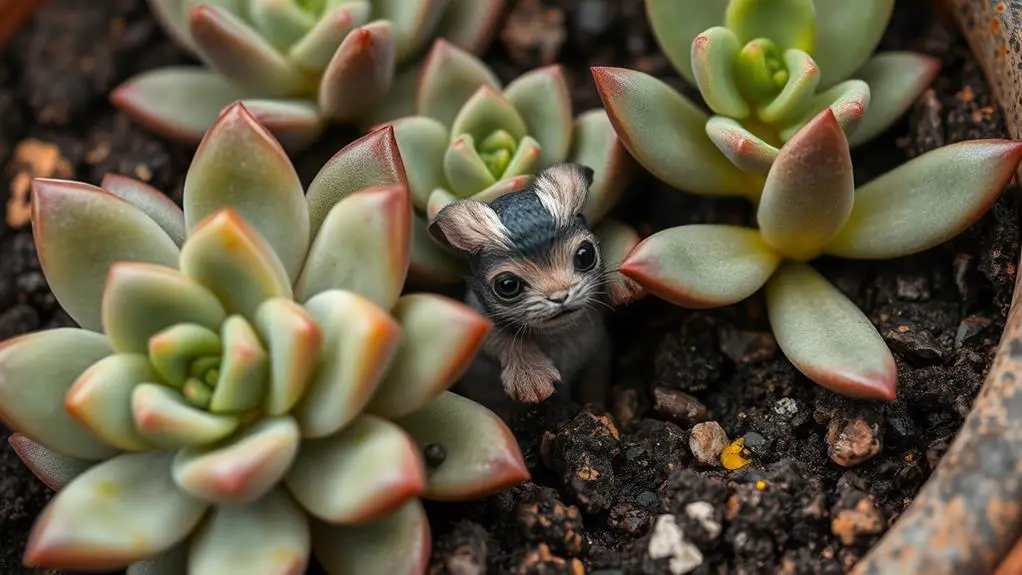
Dealing with unpleasant odors from your succulents could be due to pet urine. Pets sometimes urinate on your plants, causing a strong ammonia smell. This not only affects the air around the plant but can also harm the succulent's health.
If you suspect this might be the problem, here's what you can do:
- Immediate Cleaning: Quickly clean the affected area to remove waste and reduce odors. Use water and a mild soap to rinse the soil gently.
- Repotting: Repot the succulent in fresh soil. Old soil can retain the ammonia smell and chemicals from the urine, which could further damage your plant.
- Check Plant Health: After repotting, keep an eye on your succulent. Make sure it's recovering well and showing signs of new growth.
- Prevent Future Incidents: To stop this from happening again, move your plants to areas that are less accessible to pets. You can also use barriers to keep pets away from your succulents.
Poor Drainage
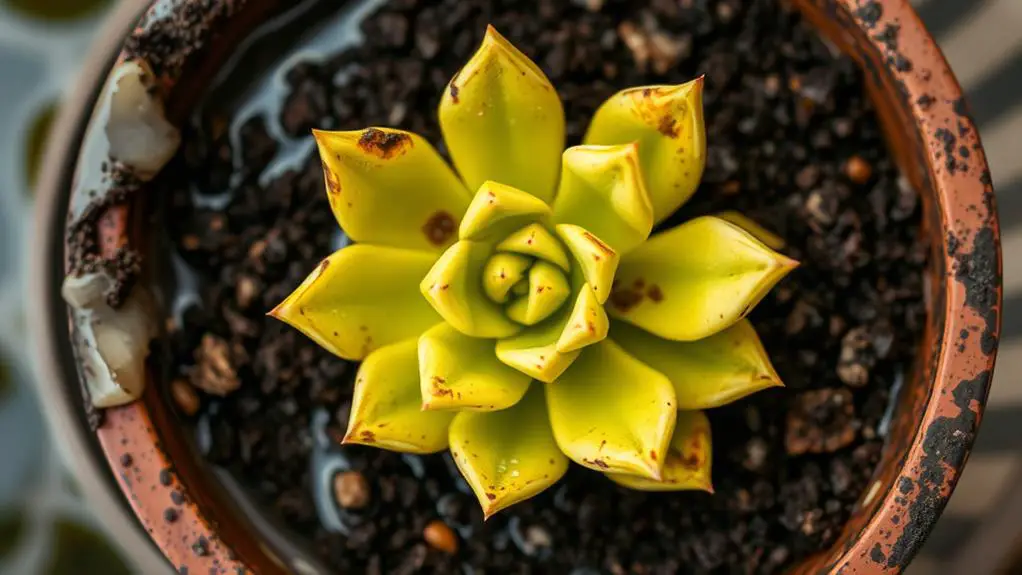
One of the common culprits behind your succulents' bad smell is poor drainage. When water can't escape from the pot, excess moisture builds up, leading to root rot and fungal infections. These issues produce foul odors that can make your succulent area quite unpleasant.
To prevent poor drainage, always use pots with drainage holes. This allows water to exit the pot and prevents stagnant water from harming your plants.
Also, choose a well-draining soil mix. A good mix includes both organic and inorganic materials, like potting soil and perlite. Aim for a mix that's about 60% potting soil and 40% perlite or vermiculite. This combination promotes effective drainage and helps avoid excess moisture.
You should regularly check the soil mixture for porosity. If the soil isn't draining well, your succulents could develop yellowing leaves and stunted growth, both signs of poor health.
Maintaining good drainage conditions not only prevents bad smells but also guarantees your succulents thrive for a long time.
Moldy Soil
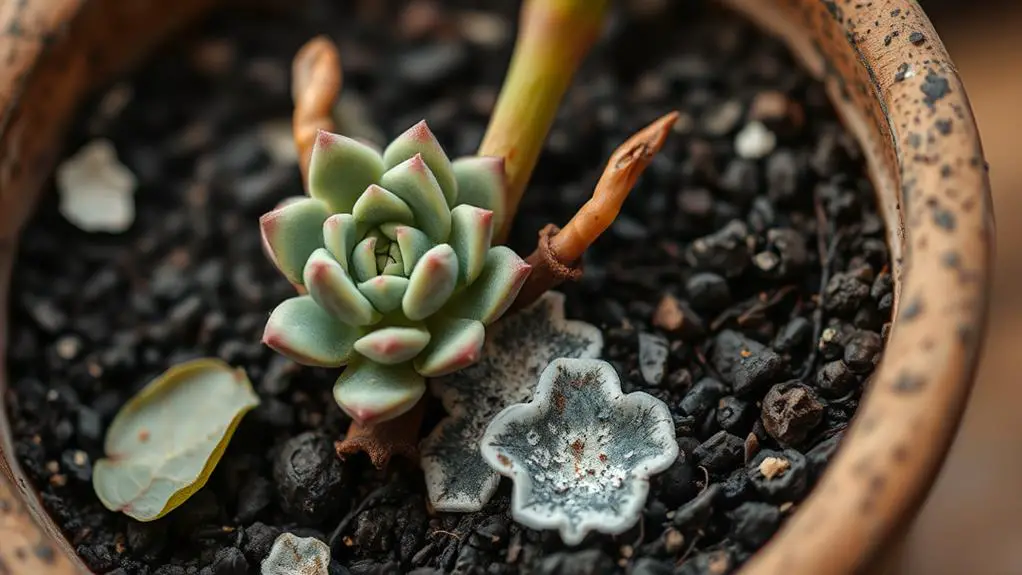
Another common reason your succulents might smell bad is moldy soil.
Moldy soil often results from overwatering, creating excess moisture that encourages fungal growth. This fungal growth can emit unpleasant odors, similar to spoiled food, and indicates your succulent is living in an unhealthy environment.
To tackle moldy soil, follow these steps:
- Remove the affected soil: Carefully take out the moldy soil around your succulent.
- Replace with fresh, dry soil: Use new soil that's completely dry to give your succulent a healthier home.
- Ensure proper drainage: Use well-draining soil and pots with drainage holes to keep excess moisture at bay.
- Monitor soil moisture levels regularly: Check the soil before watering to maintain a healthy environment and prevent future mold.
Watering Practices
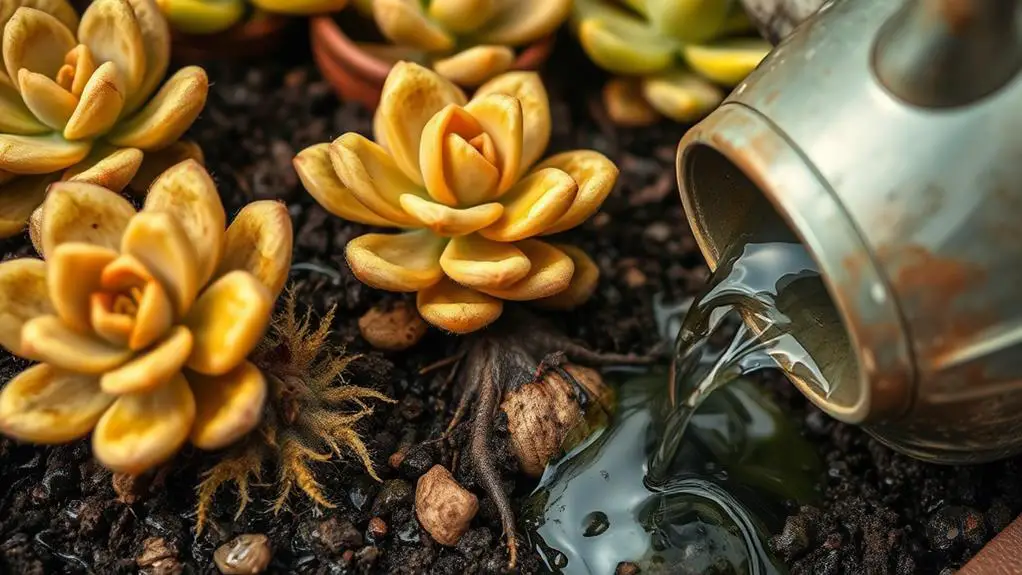
Proper watering practices are essential for keeping your succulents healthy and odor-free. Overwatering is a primary cause of bad smells because it leads to root rot. When roots decay, they emit a foul odor that can be quite unpleasant. To avoid this, be mindful of your watering routine.
One clear sign of overwatering is yellowing leaves. If you notice them, it's important to check the soil. Succulents prefer dry conditions, so let the soil dry out completely between watering sessions. Excess moisture not only stresses the plant but also encourages mold growth, which can contribute to bad smells.
Using a moisture meter can help you determine the soil's wetness and prevent overwatering. This tool is a great addition to your succulent care toolkit because it gives you an accurate read on when to water.
Keep in mind that succulents need less water during their dormant phase, typically in cooler seasons. Adjust your watering routine accordingly based on these seasonal changes.
Environmental Factors
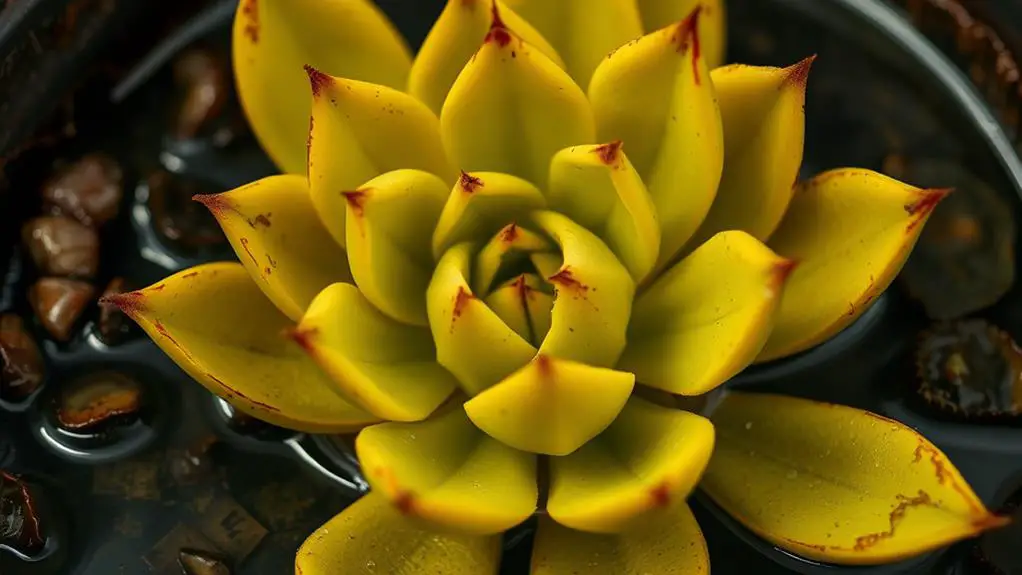
Environmental factors play a significant role in keeping your succulents healthy and smell-free. When you don't pay attention to these factors, your plants can end up smelling bad.
Here's how to manage the environment for your succulents:
- Humidity levels: High humidity can cause excess moisture on your succulents. This creates a perfect environment for mold, which leads to unpleasant smells. Keep humidity levels in check.
- Poor air circulation: If your succulents are in areas with poor air circulation, moisture can't evaporate properly. This can make your succulents smell bad. Make sure they're in well-ventilated areas.
- Temperature fluctuations: Sudden changes in temperature can stress your succulents. When they're stressed, they might start to decay, causing bad odors. Try to keep their environment stable.
- Environmental conditions: Regularly check the conditions where your succulents are growing. This makes certain you're providing an ideal growing environment, reducing the risk of unpleasant smells.
Pest Infestation
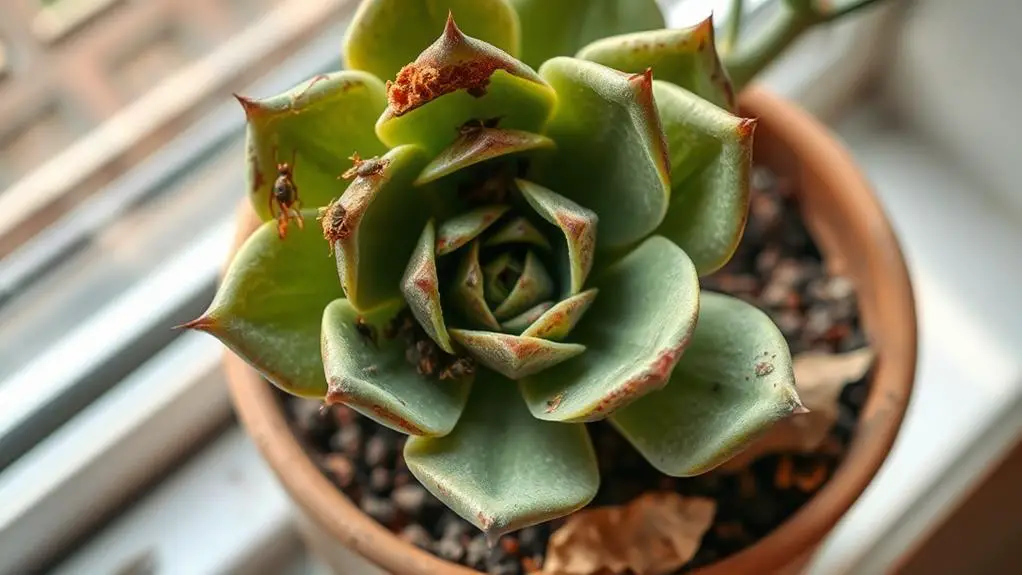
While environmental factors considerably impact the health of your succulents, pest infestations can also lead to unpleasant smells. Common pests like aphids, mealybugs, and spider mites feed on plant sap, causing decay and foul odors. These pests can create holes in stems and leaves, leading to yellowing foliage and overall decline in plant health. This decay contributes to the bad smells you may notice.
Regularly inspecting your succulents is essential for early detection of these pests. By catching infestations early, you can prevent significant damage and the resulting odors.
Here's a quick guide to help you manage pest infestations:
| Pest Type | Symptoms | Treatment Options | Preventive Measures |
|---|---|---|---|
| Aphids | Sticky residue, yellowing | Insecticidal soap | Regular inspections |
| Mealybugs | White cottony spots | Neem oil | Quarantining new plants |
| Spider Mites | Webbing, speckled leaves | Rubbing alcohol | Cleaning plant leaves |
Using treatments like insecticidal soap, neem oil, or rubbing alcohol can help eliminate pests and reduce odors. Don't forget to quarantine affected plants to stop pests from spreading to healthy ones. Keeping your succulents pest-free will help maintain a healthy and pleasant-smelling environment.
Frequently Asked Questions
Why Does My Succulent Stink?
Your succulent stinks because it likely has root rot from overwatering. Check for dark, mushy roots and guarantee proper drainage. Fungal infections, over-fertilization, or pet urine can also cause odors. Adjust watering and care accordingly.
What Are the Foul Smelling Succulents?
Some foul-smelling succulents include certain Aeonium species, especially Aeonium arboreum. They can emit unpleasant odors when stressed by factors like overwatering or poor drainage. Proper care and environmental conditions can help mitigate these smells.
Why Shouldn't You Touch Succulents?
You shouldn't touch succulents because it stresses them, disrupts their natural oils, and makes them vulnerable to pests and diseases. Frequent handling can also bruise or break their delicate leaves, affecting both their aesthetics and health.
Why Does My Plant Smell Weird?
Your plant smells weird likely due to root rot from overwatering, fungal infections, over-fertilization, pet urine, or poor drainage. Check for dark roots, excessive moisture, and guarantee proper soil and pot design for healthy growth.
Conclusion
Don't worry! If your succulents smell bad, it might be due to root rot, fungal infections, or poor drainage. Make sure you're not overwatering and that your pots have good drainage. Check for mold and pests regularly, and avoid over-fertilizing. By keeping an eye on these factors, your succulents will stay healthy and odor-free. You've got this—just follow these simple tips, and your plants will thrive! Happy gardening!

